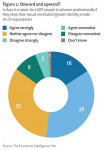Human resources assumes a more strategic role, says Economist Intelligence Unit report
Executives are beginning to appreciate the importance of a more deliberate approach to the management of people and talent, according to Building an integrated talent management strategy, a new briefing paper from the Economist Intelligence Unit and sponsored by Oracle. Based on a set of in-depth case studies of global organisations in technology, consulting, banking, retailing and government, the study describes some of the best practices in attracting, retaining and developing employees who can make a positive impact on an organisation.
“Businesses are developing enterprise-wide processes to ensure that the right employees and the right performance incentives are in place to execute strategy,” says Dan Armstrong, the editor of the report. Consequently, companies are asking for their HR departments to contribute more to the running of the company. Says Mr Armstrong: “Firms can outsource those parts of HR dealing with administration and support. What remains is more strategic.”
Added Gretchen Alarcon, Vice President HCM Product Strategy, Oracle, “Organisations are learning that when they track, evaluate and improve performance across a carefully chosen set of talent management criteria and with a holistic strategy, they can drive improvement across a broad spectrum of strategic business objectives.”
The research unveils a handful of recurring strategies, which appear to be the cornerstones of a successful approach to talent and workforce management. These include:
· Alignment with overall business objectives. HR executives are working with business heads and the C-suite to develop workforce strategies that complement and enable both short- and long-term business objectives.
· Strategic workforce planning. HR executives are collaborating with business units to assess current and future workforce needs. This, in turn, enables companies to adjust training, development, retention, compensation, recruitment and all related activities.
· Performance planning and evaluation. Integrated HR processes tie together employee performance, evaluation and compensation from the executive suite to the warehouse or sales floor. Ultimately, such processes and systems can link the value that employees create to the way that workers themselves are evaluated.
· Talent mapping. Companies are placing greater emphasis on identifying top performers and then developing ways to nurture and retain these valuable resources. As organisations learn which employees are most valuable, they can focus on attracting, developing and retaining these people.
Building an integrated talent management strategy
is available free of charge at: www.eiu.com/sponsor/oracle/talent
Notes for editors
About the Economist Intelligence Unit
The Economist Intelligence Unit is the world leader in global business intelligence. It is the business-to-business arm of The Economist Group, which publishes The Economist newspaper. The Economist Intelligence Unit provides geopolitical, economic and business analysis on more than 200 countries, as well as strategic intelligence on key industries and management practices. With over 300 full-time professionals in 40 offices around the world, supported by a global network of more than 700 contributing analysts, the Economist Intelligence Unit is widely known for its unparalleled coverage of major and emerging markets. More information about the Economist Intelligence Unit can be found at www.eiu.com.
웹사이트: http://www.eiu.com
연락처
Edgar Fernandez
Marketing Manager, Asia-Pacific
(852) 2585 3826 이메일 보내기
Fax: (852) 2802 7007
이 보도자료는 Economist Intelligence Unit가(이) 작성해 뉴스와이어 서비스를 통해 배포한 뉴스입니다.




